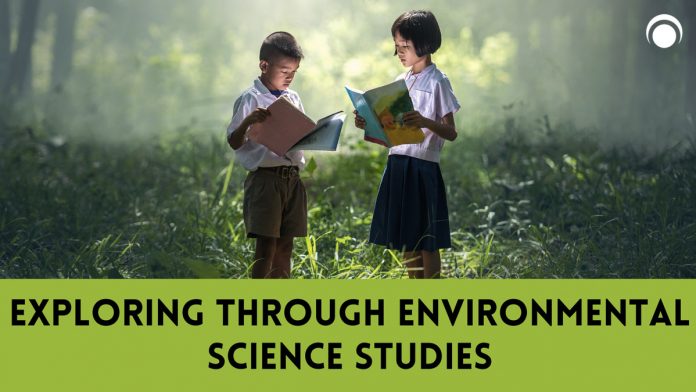What is Environmental Science?
The study of the environment is not a new thing. From the beginning of time, mankind has studied the environment. However, the branch of science dealing with environment, ie. environmental science, is a modern subject having tracing its origins to the 1960s and 70s, when the world began facing issues like population explosion, pollution etc. Environmental science is an interdisciplinary field integrating various academic disciplines like physics, chemistry, biology, ecology, geology, social science, engineering etc. Environmental science is simply the study of the environment, of solutions to various environmental problems and of the interaction between physical, chemical and biological elements in nature.
It is important for everyone to have a basic minimum knowledge of environmental science, as it helps us to understand the relationship between humans and nature, and how we need to live sustainably in our environment, the need for protecting our environment, different problems affecting our environment etc.
Environmental Science as a Degree:
The usual duration of a Bachelor’s degree in environmental science is 3 years. The eligibility to apply for admission to a degree programme is to have passed a 12th, +2 or pre-graduation examination, with science as core subject, including physics, chemistry and biology.
The duration of a Master’s degree in environmental science is 2 years. The eligibility criterion to apply for this is a bachelor’s degree either in environmental science or in any other science stream, namely geology, geography, biotechnology, microbiology, biochemistry, zoology, botany, fisheries etc.
Admissions for these courses will be merit based (entrance or academic excellence), along with interview.
Course division/ Subjects covered
During the Bachelor’s as well as Master’s courses, one will have to complete a certain number of credits (based on different universities) and it includes core subjects and elective subjects.
Core subjects: Core subjects are the major or specialized subjects in the concerned stream that one needs to cover for the completion of the course. Given below are some of the core subjects in environmental science offered by almost all universities:
· Ecology
· Environmental management
· Energy resources and conservation
· Environmental Pollution (Soil, water, air etc)
· Environmental Biochemistry
· Environmental Impact Assessment (EIA)
· Environmental Disaster management
· Environmental Ethics
· Geology
· Meteorology
· Instrumentation techniques in environmental science
· Environmental legislation and policies
· Research Methodology
· Biodiversity conservation
· Environmental biotechnology and microbiology
· Environmental Health Management
· Environmental genetics
· Environmental engineering
· Environmental Toxicology
· Environmental Chemistry
· Climate change
· Remote sensing and GIS
· Natural resources and Energy Management
Elective subjects: These are optional subjects, in relation to the main stream of study, and a student is free to choose selected subjects of interest from a wide range of subjects, offered by the respective universities. These can also become avenues in which students choose to specialize at the Master’s level. Listed below are of a few of the elective subjects related to environmental science:
· Biostatistics
· Computer science
· Marine biology
· GIS
· Environmental ecology
· Animal behavior
· Plant ecology
· Global Climate change
· Nano science
· Coastal Processes
· Environmental Modeling
· Geography
· Horticulture
· Aquatic biology
· Environmental health science
· Environmental economics
Assessment within these courses is done through written exams, viva-voce, laboratory exams, field work reports, seminars, assignments, project work, thesis work and presentations. Credits will be awarded for each, and a student needs to secure a specific number of credits for the completion of the course; the credit requirements vary with different universities/centres.
Higher Studies
· MPhil (1yr/2yr)
Eligibility: MSc in environmental science
Mode of entry: Entrance exam, interview etc
Assessment: Written exams, practicals, projects, thesis writing and presentations, viva-voce.
· PhD (3-5 yrs)
Mode of entry: Entrance, scholarships/fellowships
One needs to find a suitable topic and a guide in a desired institution. Assessment patterns will include coursework, exams, thesis, viva-voce etc.
Research publication in international journals, paper presentations in seminars etc. are other requirements.
· Post-Doctoral Research (PDF)
After completing a PhD, one can join for post-doctoral research. Just like at the PhD level, the researcher needs to select a topic under a suitable guide in concerned universities.
Scholarships:
Various scholarships are available for PhD and post-doctoral researches. These are generally awarded on the basis of merit, academic excellence, gender, caste, religion, physical ability etc. Post-doctoral research scholarships are usually granted based on the relevance of the research topic selected.
A few among the scholarships for PhD and PDF in India are mentioned below:
For PhD:
· CSIR-UGC JRF NET (Exam based)
· Swarna Jayanthi Research Fellowships in Science and Technology
· University scholarships
· Inspire fellowship (For 1st rank holders in MSc)
· KSCSTE
For PDF:
· UGC-DSKPDF
· National Environmental Science Fellows Programme
· DST Fast Track Scheme for Young Scientists
· University PDF
· ICSSR Post-doctoral Fellowship
· SERB National-PDF
· IGIDR Post-Doctoral Fellowship
Institutions:
There are many a universities and institutions offering PhD programmes in environmental science (state, national, and international levels). Selected list of such institutions are provided below. Every state in India has many reputed universities offering these programmes. Some in Kerala (list is not exhaustive), the home state of the author, are:
· Sacred Heart College, Ernakulum
· Christ College, Irinjalakkuda, Thrissur
· Mahatma Gandhi University, Kottayam
· Calicut University, Calicut
· Kerala University of Fisheries and Ocean studies (KUFOS), Kochi
· Cochin University of Science and Technology (CUSAT), Kochi
· SreeSankara College, Kalady, Ernakulam
· St. John’s College, Anchal, Kollam
· All Saint’s College, Trivandrum
· Central University of Kerala, Kasaragod
· Kannur University, Kannur
· Kerala University, Trivandrum
· St. Mary’s College, Manarcad, Kottayam
National Level (Selected):
· Indian Institute of Science, Bangalore
· Wild Life Institute in India, Uttaranchal
· Bombay Natural History Society, Mumbai
· Jamia Hamdard University, New Delhi
· Jawaharlal Nehru University, New Delhi
· Indian Agricultural Research Institute, New Delhi
International Level (Selected – Almost all these universities require English Test Scores, such as IELTS):
· University of Cambridge, UK
· University of Oxford, UK
· ETH Zurich, Switzerland
· Stanford University, US
· Harvard University, US
· University of British Columbia, Vancouver, Canada
· The University of Queensland, Australia
Skills Required:
. Communication skills- For surveys, data collection, viva voce exams, presentations etc.
. Logical skills- For analysis of data, interpretation of data etc.
. Literature skills- For assignment preparation, thesis writing, paper writing etc
. Data analysis- For project work, research etc.
. Field work/Lab work skills- Research, data collection, data analysis etc.
. Presentation skill- Seminars, paper presentations in conferences, project presentations, thesis presentations etc.
. General awareness about current environmental affairs.
. Teamwork – For effective field work, lab work etc.
. Personal discipline- Time management, associating with colleagues, regular work, attending classes, deferring to teachers etc.
Job opportunities and Risk Factors:
A few career opportunities in environmental science are as follows: Environmental officer; Waste management officer; Water resource specialist; Climate controller; Researcher (Junior Research Fellow, Senior Research Fellow, Project Assistant, Project associate, Post-doctoral research); Environmental consultant in NGO’s or private firms; Environmental scientist; Hydrologist.
Other streams related to environmental science:
GIS; Climate change; Post graduate diploma in environmental science; Environmental engineering; Environmental law; Disaster management; Eco tourism; Environmental health science
For almost all jobs, an excellent academic performance, publications in journals, work experience etc. are required.
Risk factors:
. Some occupational hazards: The jobs in this sector may involve a lot of travel, extensive field work, working with chemicals, and visiting places with environmental issues.
. Less job opportunities (especially in India)
Future prospects:
At present, there are very limited career opportunities related to environmental science in India. But many developed nations employ environmental scientists/environmental officers in all fields and are more keen on allocating large portions of their national budgets to protecting the environment. As climate change, environmental pollution, water scarcity etc. are increasing at a rapid pace, the need for people to be employed within this field is likely to increase. According to the US Bureau of Labor Statistics, an estimated growth rate of 11% is predicted in environmental science positions between 2016-2026, globally.
Conclusion:
Environmental science is an intrinsic part of our lives. Everyone must have some basic awareness of current environmental issues, and of and how to protect our environment. Even though we may not choose environmental science as a degree or career, we must learn to live sustainably and thus to make life better for our future generations. For those with a pronounced passion in this regard, specializing within this field can be rewarding and exciting.












